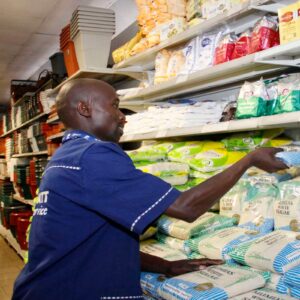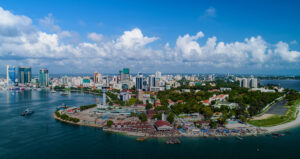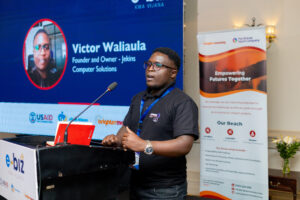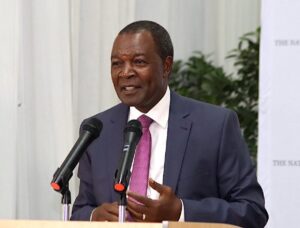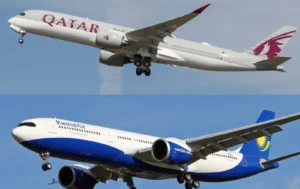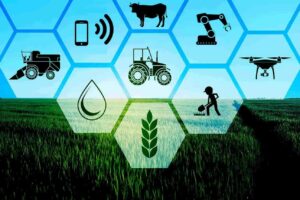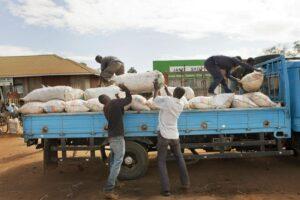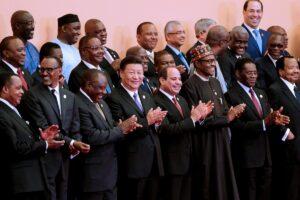- Africa’s new dawn: the rising role of digital and AI in agriculture
- Can Dangote Refinery Transform Africa Energy Ambition
- Gallup Survey: 80 per cent of Kenyan Workers Are Disengaged and Seek New Opportunities
- Madagascar Man Freed from 5KG Tumor After 15-Year Struggle
- How women in Africa are perceived and treated
- Sugar consumption in Kenya to Increase to 1.23 Million Tonnes
- Can Somalia and Turkey Oil deal Bring Change in Somaliland
- Remittances to Kenya dropped to $371.6 million in June, marking a six month low
Industry and Trade
- The construction took over 20 years and bears a processing capacity of 650,000 barrels per day 250,000 per day of gasoline and 100,000 of diesel.
- The Dangote oil refinery might halt the decades-long gasoline trade from Europe to Africa worth $17 billion each year.
Dangote Oil Refinery
Aliko Dangote, Nigeria’s and Africa’s wealthiest man ambition to foster energy reliance in his motherland and the region at large might be at risk. The giant oil refinery which is said to possess the potential to end decades-long gasoline trade from Europe to Africa worth $17 billion a year.
Concerns and tensions are high as a myriad of issues emerged before and since the $ 20 billion refinery came to life. According to various news reports, including the BBC and Reuters, the construction began in 2016 and started producing diesel and aviation fuel in January this year as petrol is expected to …
- Sugar consumption in Kenya is also expected to increase by 3.2 per cent this year driven by tourism and bakery
- Following the expiration of the ban in November 2023, production is expected to rebound significantly in 2024/25
- The survey also says that the growth in Kenya’s tourism sector will continue to create demand for sugar.
Kenya is expected to record a rise in sugar imports, as the effects of a ban on immature sugarcane processing kicks in, new findings have revealed. This is however expected to ease as millers ramp up their production
A report released by Fitch Solutions Company BMI and the United States Department of Agriculture shows that, the country should expect production to decrease by 32.9 per cent year on year in 2023/24 down to 530,000 tonnes from 790,000 tonnes in 2022/23.
This has majorly been attributed to the ban on sugarcane harvesting that was implemented in …
- According to the Turkish Energy Minister, Turkey will have exclusive rights for search and production when we find oil in these areas.
- Turkey and Somalia signed a defense and economic cooperation agreement during the Somali Defence minister’s visit to Ankara
- In March Somalia inked an oil and gas deal with Turkey which officials mentioned would foster cooperation in the exploration and exploitation of the deposits.
Somalia and Turkey Oil Deal
Despite being torn apart by civil war, Somalia’s geo-seismic studies have shown the war-torn country may have at least 30 billion barrels of oil and gas reserves.
Inching towards stability and fostering civil rest amid Islamic insurgents posing a threat to peace and harmony, Somalia’s newly discovered oil and gas deposits could be the nation’s breakthrough.
Although the resources take time to develop – exploration usually takes three to five years and production can only begin after the latter is …
- MSMEs and the e-commerce sector in Kenya are emerging as a formidable force driving economic growth.
- With over 7.4 million MSMEs contributing about 40 percent of the country’s GDP, their potential to boost the economy is huge.
- With internet penetration in Kenya currently above 74 percent, the country is well-positioned for e-commerce growth banking on an expanding middle class.
In a world where technology continuously reshapes the business scene, the relationship between Micro, Small, and Medium Enterprises (MSMEs) and the e-commerce sector in Kenya is emerging as a formidable force driving economic growth.
This dynamic was highlighted during a recent stakeholder forum reviewing the Kenya e-commerce strategy, launched in December 2023.
The strategy aims to foster innovation, inclusive participation, and economic growth through digital commerce for Kenyans, regardless of location, age, gender, or abilities.
With over 7.4 million MSMEs contributing about 40 percent of the country’s GDP, their potential to …
- Kenya’s $2billion Eurobond was set to mature on June 24, 2024
- This is an increase of $1.31 billion (Sh168 billion) to reach US$8.32 billion (Sh1.07 trillion).
- Kenya had earlier indicated the outstanding amount would be retired through a mix of syndicated, multilateral & domestic financing.
Kenya has cleared the remaining $556.97 million (Sh71.5billion) of the $2billion (Sh257billion) Eurobond that was due by June 24, 2024. Figures by the National Treasury’s Public Debt Management Office indicate that says the outstanding note was settled on Friday, June 21, three days ahead of the maturity date.
The repayment has seen Kenya’s National Reserves move above the four-month statutory requirement for the first time in five months.
…“The usable foreign exchange reserves remained adequate at $8.32 billion equivalent to 4.3 months of import cover as of June 20. This meets the CBK’s statutory requirement to endeavor to maintain at least 4 months of import
- The UAE, Saudi Arabia, and Qatar, have poured billions into developing airports, airlines, and seaports across Eastern Africa in the last 10 years.
- In the latest development, UAE’s Sharjah Chamber of Commerce and Industry is set to build a new international airport just outside Kidepo National Park, in Uganda.
- These investments are transforming the region into a pivotal stopping ground for global trade, tourism, and travel.
The economic ties between the Gulf Cooperation Council (GCC) countries and Eastern Africa have deepened significantly over the past 10 years, driven by strategic investments in key infrastructure.
The Gulf nations, notably the United Arab Emirates (UAE), Saudi Arabia, and Qatar, have poured billions into developing airports, airlines, and seaports across Eastern Africa.
These investments are transforming the region into a pivotal stopping ground for global trade and travel, enhancing connectivity, and fostering economic growth.
Eastern Africa airports and airlines enhancing connectivity
The UAE …
-
- Africa failing to meet the needed sustainable agriculture practices
- Adoption of sustainable agricultural practices remains low across the continent
- Digital development key to agro-development in Africa
Food inflation in Africa
Food inflation in Africa is worsening by the day, with the World Bank reporting that 5 of the World’s top 10 countries with the highest real food inflation rates are African countries.
The World Bank’s May 2024 “Food Security Update” highlights sustainable agriculture importance to Africa’s agri-food systems.
“The tenets of sustainable agriculture entail reconciling environmental and social equity with economic development in order to provide for the present without compromising the ability of future generations to meet their own needs,” reads the report in part.
Analysts suggest that sustainable agriculture practices seem elusive for Africa, given that Africa holds 60 per cent of the World’s arable land. Yet, it cannot feed itself, let alone the rest of the World.…
Intra-regional trade in Africa serves as the backbone of economic transformation. East African Community (EAC) member states are increasingly trading with one another and with other African countries. At the same time, they reduced their trade with other continents like Europe, Asia, and other parts of the world, shaping the intra-regional trade in Africa’s dream projected to boost commerce and livelihoods on the continent.
The seven countries in the region (as of 2023) increased their trade with the rest of Africa by $584.6 million to $4.3 billion in the fourth quarter of 2023, a 14 per cent rise compared with a similar period in 2022, according to the latest data by the EAC Secretariat.
Cross-border trade within the region also recorded a 12 per cent rise, from the previous year’s $2.6 billion to $2.9 billion in last year’s Quarter 4, indicating rising trade within the region over the year.
During …
- Singaporean firm Tolaram will acquire Diageo’s 58.02% shareholding in Guinness Nigeria PLC.
- Tolaram has significant and extensive operations and a 50-year presence in Nigeria.
- Diageo will also remain in the country through its wholly owned international premium spirits business built to serve a wider geographic reach across West Africa, with Nigeria as one of the main operational hubs.
In a major shake-up in Africa’s beverage industry, Guinness Nigeria has announced that Tolaram, a Singaporean company, has signed an agreement to acquire UK-based Diageo’s 58.02 per cent shareholding in the company. This acquisition is set to be completed in 2025, subject to regulatory approvals in Nigeria.
In the deal, Diageo will retain ownership of the Guinness brand, and it will be licensed to Guinness Nigeria for the long-term, enabling its continued growth and development in the country under the stewardship of Tolaram.
Abidemi Ademola, Guinness Nigeria’s secretary and legal director disclosed …






